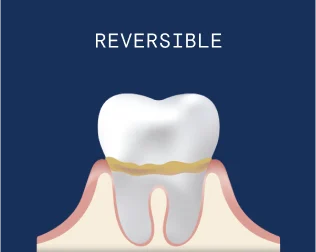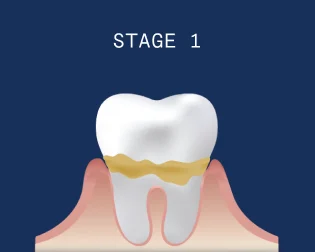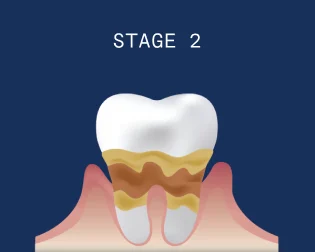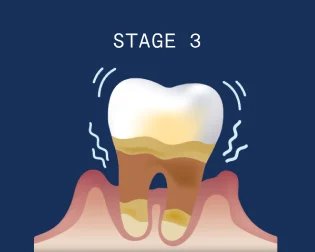Maintain oral hygiene
Floss and brush gently with a soft-bristled brush. This includes having regular dental checkups with your local Aspen Dental care team to start early treatment, if needed.
Have you noticed that your gums seem to be disappearing and revealing more of your teeth? It could be a sign of receding gums, also known as gum recession or gingival recession. The good news is your Aspen Dental care team can help.
Understanding what causes receding gums can help you prevent a variety of dental issues, including increased sensitivity, tooth decay and even tooth loss. Often times, changing your habits or lifestyle choices can help.
Bleeding when brushing or flossing. Redness or swelling is an indication of inflammation and possible infection.
Recession makes teeth appear longer than normal because the gums have crept back from their usual position. Sometimes the tooth roots may even be exposed.
You may find it painful to consume hot, cold, sweet or acidic foods and drinks.
The supporting structure of the gums can actually cause your teeth to loosen.
Persistent or intermittent pain can occur at the gumline.
This is due to accumulation of bacteria and plaque.
Click on each stage to learn more about what it means for your gum health.

Gums are red, swollen, and bleed easily.
No damage to bone and connective tissues yet.

Slight recession begins.
Early bone loss; small pockets form below the gum line.

Increased gum recession.
Deeper pockets; noticeable bone loss.
Possible damage to supporting structures.

Severe gum recession.
Substantial bone loss; teeth may become loose or fall out.
If your teeth appear larger than normal or if your gums are feeling extra sensitive, it could be an early sign of gum recession. To stop things in their tracks, speak with your Aspen Dental dentist about the best treatment for your smile.
Getting your gums back in shape can take a little bit of time, but your Aspen Dental care team can help guide you back to the path to great oral health. Depending on the severity of the condition, more advanced measures may need to be taken. Some treatment options include:
Dental checkups and cleaning
Scaling and root planing
Gum grafting
Orthodontic treatment
Mouth guard
Regardless of what causes gum recession, knowing how to prevent it is important. Follow these tips to minimize your risk of receding gums and boost your overall oral health:
Floss and brush gently with a soft-bristled brush. This includes having regular dental checkups with your local Aspen Dental care team to start early treatment, if needed.
Consuming a balanced diet rich in vitamins and minerals supports gum health.
Reduce the risk of plaque buildup and gum disease by avoiding tobacco. Add antimicrobial mouthwash to your routine to help control bacterial growth.
To fix receding gums, your Aspen Dental dentist may recommend treatments such as scaling, grafting or better oral hygiene practices to promote gum tissue regeneration. Find a dentist near you.
Receding gums don't naturally grow back. However, early intervention with professional treatments like gum grafting or pinhole surgery can help restore gum tissue. Good oral hygiene and regular dental check-ups are essential to prevent further recession and support gum health.
Prevent receding gums by maintaining good oral hygiene, including gentle brushing, daily flossing, mouthwash use, quitting smoking, managing teeth grinding, and regular dental visits.
Gum recession results from various factors like poor oral care, aggressive brushing, structural issues, genetics, tobacco use, hormones and teeth grinding.
Discover more for your smile
Don’t ignore the signs of receding gums. Schedule an appointment with Aspen Dental to discuss treatment options and stop symptoms before they get worse.